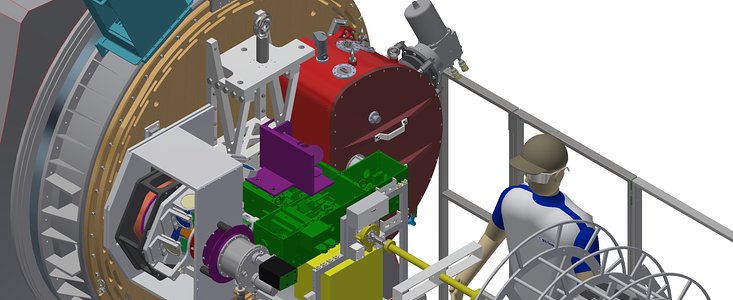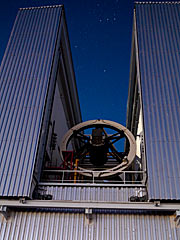Anuncio
Observatorio La Silla de ESO adquirirá el instrumento de vanguardia SOXS
8 de Octubre de 2018
ESO ha firmado un convenio con un consorcio internacional encabezado por INAF, el Instituto Nacional de Astrofísica de Italia, para construir y operar un instrumento espectrográfico de vanguardia conocido como Son Of X-shooter, SOXS [1]. Desde el 2017 se está trabajando en el diseño de este innovador instrumento, de tal forma SOXS podría instalarse en La Silla a principios del 2020.
SOXS se instalará en el New Technology Telescope (NTT) de 3,58 metros del Observatorio La Silla en Chile, en reemplazo a SOFI, un instrumento muy productivo y reconocido de ESO, que ha estado operativo por más de 20 años. Diseñado como una instalación espectroscópica única, SOXS estudiará fuentes transitorias siguiendo detonantes y alertas provenientes de telescopios, satélites y detectores en todo el mundo.
SOXS brindará observaciones de seguimiento espectroscópicas vitales para muchos sondeos transitorios, y está destinado a convertirse en el principal instrumento de seguimiento de fuentes transitorias del hemisferio sur. El novedoso y altamente especializado diseño del instrumento asegurará que este tendrá prácticamente la misma sensibilidad que su antecesor, X-shooter, pese a ser instalado en un telescopio mucho más pequeño.
Los transitorios son eventos astronómicos que, como el nombre lo indica, son visibles por un corto período de tiempo. Lo que incluye algunos de los fenómenos astrofísicos más fascinantes como las supernovas y estallidos de ondas gravitacionales. Es fundamental que a estos detonantes se les haga un seguimiento en cuestión de horas, y hasta en minutos, con instalaciones espectroscópicas especializadas como SOXS. Las fuentes transitorias están siendo descubiertas a un ritmo impresionante, que solo aumentará gracias a los futuros telescopios de sondeo, haciendo de la combinación del instrumento SOXS y del NTT una herramienta astronómica absolutamente necesaria para capturar estos eventos fugaces en longitudes de onda que van desde la ultravioleta hasta el infrarrojo cercano.
Desde su nuevo hogar en el NTT del Observatorio La Silla, SOXS hará un seguimiento de una variedad de eventos transitorios astronómicos en todas las escalas de distancia y de todas las ramas de la astronomía. Sus objetivos incluirán alertas rápidas provenientes de telescopios espaciales (como estallidos de rayos gamma) o detectores de ondas gravitacionales, alertas de medio plazo (como supernovas y eventos transitorios de rayos X), monitoreo a largo plazo de fuentes variables (como blazares, y sistemas binarios cataclísmicos), espectroscopia de tránsito de planetas extrasolares o eventos puntuales como el paso cercano de cuerpos menores recién descubiertos. Además de su impresionante capacidad para estudiar eventos transitorios, SOXS también podrá realizar observaciones rutinarias de objetos que son simplemente demasiado brillantes para ser observados por otros instrumentos como X-shooter.
Se espera que el instrumento SOXS vea su primera luz durante el 2020, y que empiece a funcionar el 2021. El contrato prevé 5 años de operación con una posible extensión por otros 5 años.
Notas
[1] SOXS (Son of X-shooter) es la evolución del instrumento X-Shooter instalado en el VLT. El consorcio de SOXS lo componen: INAF (Italia), el Instituto Weizmann de Ciencias: (Israel), la Universidad Andrés Bello y el Instituto Milenio de Astrofísica (Chile), la Universidad de Turku & FINCA (Finlandia), la Universidad de la Reina de Belfast (Reino Unido), la Universidad de Tel Aviv (Israel), y Instituto Niels Bohr (Dinamarca).
Enlaces
Contactos
Hans-Ulrich Käufl
ESO
Garching bei München, Germany
Tel: +49 89 3200 6414
Email: hukaufl@eso.org
Sergio Campana
INAF – Osservatorio astronomico di Brera
Via E. Bianchi 46
Merate (LC) – I-23807, Italy
Tel: +39 02 72320418
Email: sergio.campana@brera.inaf.it
Calum Turner
ESO Public Information Officer
Garching bei München, Germany
Tel: +49 89 3200 6670
Cell: +49 151 1537 3591
Email: pio@eso.org
Sobre el anuncio
| Identificador: | ann18070 |
Our use of Cookies
We use cookies that are essential for accessing our websites and using our services. We also use cookies to analyse, measure and improve our websites’ performance, to enable content sharing via social media and to display media content hosted on third-party platforms.
ESO Cookies Policy
The European Organisation for Astronomical Research in the Southern Hemisphere (ESO) is the pre-eminent intergovernmental science and technology organisation in astronomy. It carries out an ambitious programme focused on the design, construction and operation of powerful ground-based observing facilities for astronomy.
This Cookies Policy is intended to provide clarity by outlining the cookies used on the ESO public websites, their functions, the options you have for controlling them, and the ways you can contact us for additional details.
What are cookies?
Cookies are small pieces of data stored on your device by websites you visit. They serve various purposes, such as remembering login credentials and preferences and enhance your browsing experience.
Categories of cookies we use
Essential cookies (always active): These cookies are strictly necessary for the proper functioning of our website. Without these cookies, the website cannot operate correctly, and certain services, such as logging in or accessing secure areas, may not be available; because they are essential for the website’s operation, they cannot be disabled.
Functional Cookies: These cookies enhance your browsing experience by enabling additional features and personalization, such as remembering your preferences and settings. While not strictly necessary for the website to function, they improve usability and convenience; these cookies are only placed if you provide your consent.
Analytics cookies: These cookies collect information about how visitors interact with our website, such as which pages are visited most often and how users navigate the site. This data helps us improve website performance, optimize content, and enhance the user experience; these cookies are only placed if you provide your consent. We use the following analytics cookies.
Matomo Cookies:
This website uses Matomo (formerly Piwik), an open source software which enables the statistical analysis of website visits. Matomo uses cookies (text files) which are saved on your computer and which allow us to analyze how you use our website. The website user information generated by the cookies will only be saved on the servers of our IT Department. We use this information to analyze www.eso.org visits and to prepare reports on website activities. These data will not be disclosed to third parties.
On behalf of ESO, Matomo will use this information for the purpose of evaluating your use of the website, compiling reports on website activity and providing other services relating to website activity and internet usage.
Matomo cookies settings:
Additional Third-party cookies on ESO websites: some of our pages display content from external providers, e.g. YouTube.
Such third-party services are outside of ESO control and may, at any time, change their terms of service, use of cookies, etc.
YouTube: Some videos on the ESO website are embedded from ESO’s official YouTube channel. We have enabled YouTube’s privacy-enhanced mode, meaning that no cookies are set unless the user actively clicks on the video to play it. Additionally, in this mode, YouTube does not store any personally identifiable cookie data for embedded video playbacks. For more details, please refer to YouTube’s embedding videos information page.
Cookies can also be classified based on the following elements.
Regarding the domain, there are:
- First-party cookies, set by the website you are currently visiting. They are stored by the same domain that you are browsing and are used to enhance your experience on that site;
- Third-party cookies, set by a domain other than the one you are currently visiting.
As for their duration, cookies can be:
- Browser-session cookies, which are deleted when the user closes the browser;
- Stored cookies, which stay on the user's device for a predetermined period of time.
How to manage cookies
Cookie settings: You can modify your cookie choices for the ESO webpages at any time by clicking on the link Cookie settings at the bottom of any page.
In your browser: If you wish to delete cookies or instruct your browser to delete or block cookies by default, please visit the help pages of your browser:
Please be aware that if you delete or decline cookies, certain functionalities of our website may be not be available and your browsing experience may be affected.
You can set most browsers to prevent any cookies being placed on your device, but you may then have to manually adjust some preferences every time you visit a site/page. And some services and functionalities may not work properly at all (e.g. profile logging-in, shop check out).
Updates to the ESO Cookies Policy
The ESO Cookies Policy may be subject to future updates, which will be made available on this page.
Additional information
For any queries related to cookies, please contact: pdprATesoDOTorg.
As ESO public webpages are managed by our Department of Communication, your questions will be dealt with the support of the said Department.


